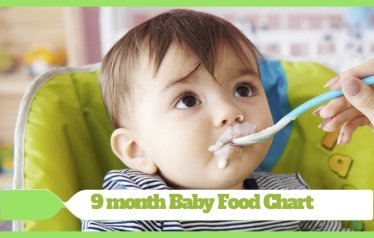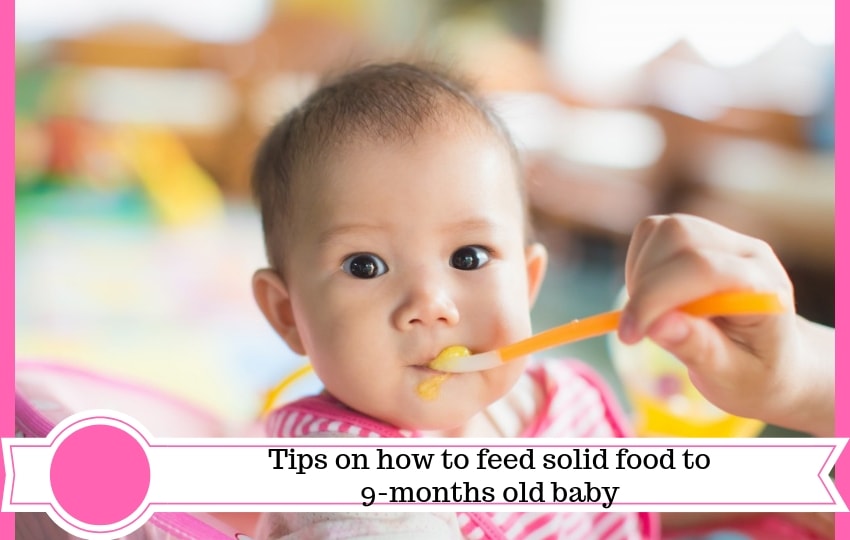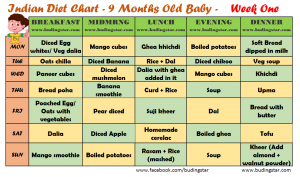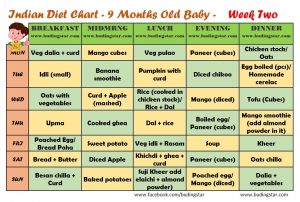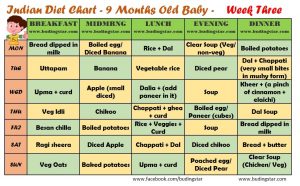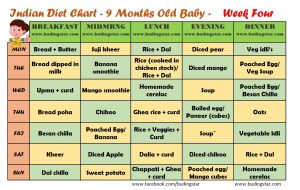——————- In this Article——————
Tips on how to feed solid food to 9-month baby
Foods to include & avoid in 9-month baby food chart
9 month baby food chart – First Week
9 month baby food chart – Second Week
9 month baby food chart – Third Week
9 month baby food chart – Fourth Week
Congratulations Mom! You and your baby have turned 9 months. Now your little bundle of joy is getting closer to toddlerhood. Well, worried about your 9-month-old baby’s food? If this is so, this post is a must-read for you. In this article, the Indian Food Chart for 9 months 9-month-old baby and tips on how to feed him/her are discussed.
Now your baby may have started to understand gestures, pointing and mumbling to indicate her wants. These are a few of the 9-month-old milestones. So, playtime with her shall be becoming more joyful now. Isn’t it? But when it comes to food, most of the babies are fussy eaters. Thus, introduce/offer the foods in a very playful manner so that meal time also becomes another pleasure time for her.
How much food should a baby eat per day at this stage?
The ideal weight of a 9-month-old baby will be between 7Kg to 10Kg. This is completely fine, and the weight is appropriate for the infant’s mouth. A 9-month baby diet chart is similar to when they were first born which means that they have an on-demand schedule or should be given food like formula, breast milk or solid foods when they show signs of being hungry in quantities like :
- 4-6 oz of breast milk,
- ¼ cup cereal,
- ¼ to ½ cup of vegetables,
- ¼ to ½ cup of fruit,
- ½ to ¼ cup of dairy products or
- 4 tbsp of protein or meat etc
Can you give your baby finger foods and snacks?
Nine-month-old babies are usually prepared for finger foods and snacks. If you observe your baby picking up small objects or small bites of food and can chew it without any support, then it is time to introduce finger foods to your baby. Finger foods should be cooked so that it is easy for the baby to chew such as apples, pears or even paneer. 1 or 2 snacks can be included between meals at regular intervals and in small quantities
Before sharing a 9-month-old feeding chart or 9-month-old baby food chart, let us know important tips on how to feed a 9-month-old baby.
Important Tips on How to Feed Solid Food to 9 Months Baby:
- Always give properly fresh cooked, soft textured and easy-to-digest foods as the baby’s digestive system is still developing. Don’t store the fruit and vegetable puree.
- Now you can offer your baby, 3 main meals a day (i.e. Breakfast, Lunch and Dinner) and in between 2 snacks time (morning and evening).
- Always remember that breastfeeding/ formula feeding is very important and should be continued as and when required by the baby.
- Try to show your little munchkin how to put the food in their mouth as it can help her to learn a new skill of self-feeding.
- Let the baby try drinking from a sippy cup, and let them enjoy it for a few months as it will help in leaving the habit of drinking from the bottle.
- If a baby develops any food allergy then stop feeding that food. Also, consult your paediatrician in such cases. (Diarrhea, vomiting, constipation, rashes and too much crying due to stomach pain are the symptoms in babies of any food allergy.)
- You can also give finger foods (easy-to-eat pieces of food that your baby can pick up and eat by herself) like bread, pasta, cottage cheese cubes, tofu cubes, etc. Though finger foods get easily dissolved, still you need to be around them when they are having food to avoid the choking hazard.
- Try the foods she once rejected after a few days. She may start liking it. Sometimes the mothers feed them food repeatedly, thinking that their baby really likes it. Instead, the baby gets bored of that food and hence starts rejecting it. So, feed them a variety of foods and try not to repeat but do remember the 3-day wait rule too while introducing new foods to her.
- Refrain your baby from watching TV, mobile phone, etc. when you are feeding anything. While feeding her food, play some innovative games or make her listen to a very pioneering story. So, moms for tackling your little fussy eater learn some new stories that require loads of acting. At this stage, she may be getting very fussy due to sore gums (teething problem).
- Be patient Mommies..! Don’t feed anything forcefully to the baby. Also, never overstuffed his mouth with food.
- Sterilize the baby utensils that are used for cooking and feeding.
- Be careful while feeding your baby as the introduction of some solid foods can cause constipation or Diarrhea too. 9 months old for solids is one of the best options to go with.
- Water intake is a must for a baby. Intake of water must be 2 to 4 ounces per day (i.e. 60 to 120 ml).
- Feed your baby when she is sitting in a proper sitting position. Make your baby sit on the high chair while feeding.
| Choose the best high chair on Amazon for your little one from the links given below:
|
|---|
Before I write down 9-month baby food chart, let us first see the list of foods that you can include and those you should avoid in your baby’s food chart.
Nutrients Needed For Baby
A 9-month baby feeding schedule should have the following nutrients for your baby:
Proteins
Protein is essential to encourage proper growth and development of your baby. While putting together ideas for feeding your 9-month-old, make sure that protein intake is appropriate.
Fibre
Fibre is one of the essential nutrients for babies as it helps in improving digestion, prevents constipation, and aids in weight management. Since the babies would start their solids, constipation will occur at times; Which is why fibre-rich foods should be added to their diet.
Calcium
Babies in their 9th months need 260 mg of calcium a day. So, adding foods like milk and other dairy products, broccoli, cabbage, oranges, etc would be a better option.
Carbohydrates
Healthy carbs like potatoes, rice etc., will fill your baby with energy and empower him to go about his day in a sprightly manner.
Fats
You can incorporate healthy data in your baby’s diet through breast milk, formula milk, butter, etc. Consult your paediatrician before making changes to your baby’s diet. Also, wait for 3-5 days before introducing any new foods.
Apart from the above-mentioned nutrients, calcium, Vitamin D, Iron, fibre and Vitamin C are also important components of your baby’s meal plan.
Everyday Must-Have Foods for 9 Month Baby:
It is important to keep the foods balanced and filled with nutrients every single day. Plan the meal according to the above-mentioned nutrients to get maximum benefits and make kids healthy.
Foods to include in the Indian Food Chart for 9 months old baby:
At 9 months, you can introduce the below foods in addition to a 6-month food chart, 7-month food chart and 8-month food chart. So, here is the list of foods to be included in the 9-month baby food chart:
- This is a phase when you should remember “EAT A RAINBOW”. Include lots of fruits and vegetables of different colours and textures. Add apples, bananas, oranges, mangoes, chikoo, litchi, watermelon, muskmelon, carrots, beans, peas, beetroot, and potato.
- At nine months you can go ahead and introduce finely chopped and diced table foods. Table foods become an existing addition to the feeding regime. Try diced mangoes, bananas, chikoo, nicely cooked carrots or other vegetables.
- Include different grains and cereals like rice, dalia, and bread.
- Try to add eggs, chicken and fish.
Important points to remember for feeding above mentioned foods:
- Cut the fruit into small pieces as it can cause choking to the baby.
- Vegetables should be properly cooked before feeding. Chicken and fish should be cooked properly and should not be left raw from any side.
- Avoid processed meats like sausages, ham, and salami.
Foods to avoid in the Indian Food Chart for 9 months Baby:
Some foods pose a choking hazard and a few aren’t good for your baby’s digestive system. Here is a list of some foods to be avoided in a 9-month baby food chart:
- Cow’s & Soy’s Milk
- Uncooked Vegetables
- Nuts
- Honey
- Acidic fruits
| Know the complete list of foods that are unsafe for your baby by clicking on the link mentioned below: Foods unsafe for your baby (below the age of 1 year) |
Now, that we know what food is to be included and to be avoided, here is a 9-month baby food chart Indian for your reference.
Indian Food Chart for 9 months old Baby:
Here is a sample menu for a baby who is in their 9th month. The food ideas with the chart are given below in detail for every week:
First Week:
When adding food ideas with the chart for a 9th-month-old baby food, try sticking to single-ingredient purees which are easy to digest for your little one. You can go for mashed fruits and boiled/mashed vegetables.
Second Week:
After establishing your child’s taste in purees, week 2 is a great time for you to mix two or more purees to create yummy dishes. This is a great time for you to add interesting combinations to your 9-month baby feeding schedule.
Third Week:
Week 3 is the correct time for you to add some texture to your baby’s Indian meal plan. You can add some finger food like idli, chilla etc.
Fourth Week:
Week 4 is an ideal time to create a comprehensive and eclectic Indian meal plan for your kid, that involves all his/her favourite foods. Always remember to wait at least 3-5 days before introducing any new recipes.
You can note down all the Food/ Meal recipes referred to in the above four charts by clicking on the link mentioned below:
9 Month Baby Food Chart Recipes
Important Tip: In addition to the above-mentioned food chart, you can give light foods (fruits/vegetables/ finger foods) in between as and when required by the baby (when the baby feels hungry). Also, do continue Breastfeeding/ Formula milk to the baby.
NOTE:- This 9-month baby food chart is framed to just give you an idea about the food items that you can include. You can make changes in timings according to the baby’s taste and acceptability for that particular food item, also changes can be made on the basis of the availability of the food item. Strict meal times are not mandatory. Feed him whenever he is hungry.
FAQs
1. How frequently should a 9-month-old infant eat throughout the day?
A 9-month-old baby can eat 3 proper meals every day as you do- breakfast, lunch, and dinner. They can also eat snacks twice a day- morning and evening. However, it’s important that your baby follows a 9-month-old food chart to ensure that during these meals, they get proper nutrition. Giving your baby finger food is a great option since it dissolve easily.
2. Is it still appropriate for a 9-month-old to eat pureed food?
After 8 months, a baby can handle pureed foods and milk. Therefore, it’s time to feed them table foods according to their 9-month baby food chart Indian. Change your baby’s eating habits slowly and feed them different textures and tastes from every food group. Refer to your 7-month baby diet chart when you introduce new foods.
3. What shouldn’t a 9-month-old eat?
Babies under the age of 9 months shouldn’t consume certain foods. You need to ensure that your 9 monthly baby food chart for Indians doesn’t contain these foods:
- Honey
Honey might cause botulism in babies. Botulism is a serious problem that might cause difficulty in breathing.
- Cow’s milk and soy milk
Don’t give your baby any other type of milk other than formula or breast milk.
- Popcorn, nuts, and raw vegetables
These kinds of foods might cause choking. Avoid grapes, hard cheese, hot dogs, and any such foods.
- Added sugar
Don’t include foods containing added sugar or no-calorie sweeteners in your 9-month-old baby diet chart.
- Sodium-rich foods.
Don’t include any food that has large amounts of sodium or excess salt.
- Acidic fruits
Acidic fruits such as oranges might cause harm to your baby’s developing gastrointestinal system.
Buding Star offers you advice on all kinds of problems right from your baby’s food chart to some minor games for a fun evening. Help your ‘buding star’ grow!
Do leave a comment if you have any queries related to the Indian Food Chart for 9 months old Baby.
4. How much food should a 9-month-old eat?
The 9-month baby food chart says that babies will eat three meals a day, in addition to breast milk or formula, by the time they are nine months old. Additionally, some infants are prepared for morning and midday food. Although it may seem like a lot of food, they only actually eat a modest amount each time.
A 9-month-old baby food chart should have at least 750 to 900 calories per day, of which more than half (about 400 to 500 calories) should come from breast milk or formula. The breakdown of what this might entail is as follows:
- Breast milk or formula three to five times each day which is around about 30 to 32 ounces.
- Cereal with added iron, or meat or veggies high in iron 5-8 tablespoons
- Fruits Twice a day, 2 to 4 tablespoons
- Vegetables Twice a day, 2 to 4 tablespoons
- Proteins and meats two to three teaspoons, twice daily
- Starches (potatoes, spaghetti, bread) (potatoes, pasta, bread) 1/4 to 1/2 cup twice daily.
Ask your doctor about vitamin D and iron supplements if you’re breastfeeding if it is about 9 months baby diet chart.
5. What is the normal weight of a 9-month-old baby?
9-month-old babies typically weigh 18 pounds for girls and 20 pounds for boys. The typical length of a baby at 9 months old is slightly over 28 inches for girls and slightly under 28 inches for boys, according to the World Health Organization.
These measurements will undoubtedly differ from kid to kid, as it also depends on their diet and on their 9-month-old baby food, particularly for premature infants. Your baby should be gaining 3 to 5 ounces per week at this age and using 4 to 5 wet diapers per day. Share any worries you may have with your paediatrician. They can respond to your inquiries and inform you of any actions you can take to promote the growth and development of your child.
6. How much water should a 9-month-old drink?
Water is the most hydrating beverage you can consume as an adult. It satisfies your thirst and maintains the equilibrium of all of your systems.
However, infants and toddlers don’t require as much water as adults do. In fact, it might be harmful to them. All of a baby’s fluid needs are met by breast milk or formula.
Only breast milk or formula should be given to a newborn up until the age of six months. It provides them with all the nourishment and hydration they require at the beginning. Breast milk and formula are still more crucial than water for infants, even when you start offering them purees or table food at roughly 6 months of age. However, you can start introducing it.
Water is still preferred over breast milk or formula for infants between the ages of 6 and 12 months. However, if you initially provide breast milk or formula, you can then give 2-3 ounces of water at a time. 4 to 8 ounces of water per day are sufficient at this age. Any more could result in water intoxication.
Happy Parenting!
- 7 Month Baby Food Recipes - January 19, 2021
- 7 Month Baby Food Chart - January 19, 2021
- 9 Month Baby Food Chart - January 14, 2021
- 9 Month Baby Food Recipes - January 14, 2021
- 10 Month Baby Food Chart - January 14, 2021
- 8 Months Baby Food Chart for Indian - January 14, 2021
- 19 Best Indian 6 Months Baby Food - January 14, 2021
- Indian Food Chart Recipes for 8 Months old Baby - February 20, 2018
- Indian Diet Plan for 6 Months Old Baby - January 12, 2018

